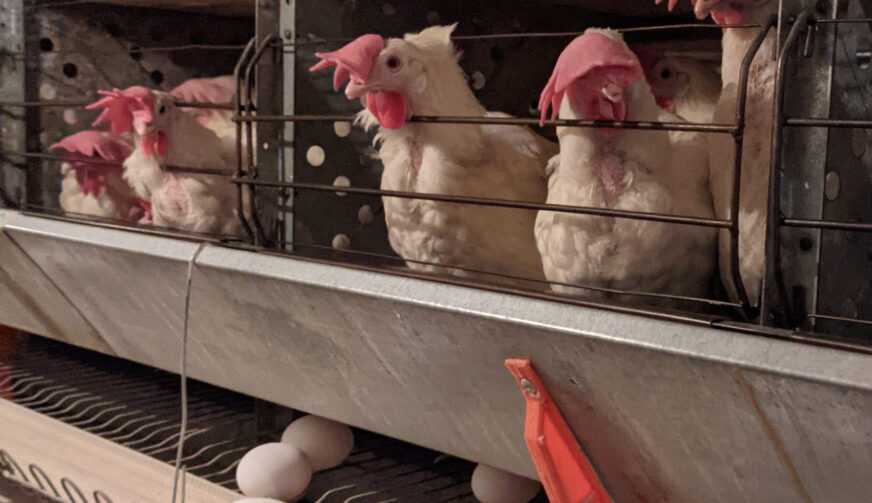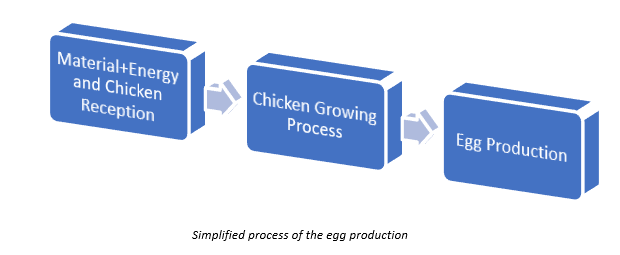
Read in Georgian.
The production of eggs and poultry
Greatly valued for their high nutritional value, accessibility, and low cost, eggs have been a part of the human diet for thousands of years. Since the 1990s, global egg production has skyrocketed, increasing to 86.67 million tonnes in 2020.[1] Alongside, so did the demand and production of poultry. In the past two decades, poultry has emerged as the most consumed livestock commodity, worldwide. This is mainly because, compared to other types of livestock, chickens mature and reach market weight more quickly because they convert feed to meat more efficiently than larger animals. Moreover, chickens can be raised in small spaces, meaning that producers can raise poultry in a variety of environments. Such advantages help make both egg and meat production more feasible and affordable, especially in developing countries and emerging markets.
In our modern world, large-scale egg production has been primarily concentrated in big, commercially-owned farms, where it undergoes a long production process until the eggs become available on the shelves or refrigerators. The production process in the egg industry begins with the introduction of chicks. The chicks are either hatched on-site or imported when they are several days old. In both cases, the facility intended for their habitation requires acute control of both temperature and humidity, as well as different feeding schedules and medication – conditions which are pre-defined before the production cycle can begin. After approximately 17-19 weeks of rearing, the now-grown chickens are ready to be moved to begin egg production[2]. The eggs resulting from the grown hens are then checked for quality control and packaged for distribution.

Teleti Poultry Factory Ltd and its endeavour to improve its resource efficiency
In Georgia, the egg industry owns more than 10 million hens; in 2021, it was responsible for the production of 638 million eggs[3]. As the domestic production of eggs is fluctuating (with a 5% decline in 2021 compared to 2020), and imports of key material sources continue to rise, the utilization of locally available resources is becoming more relevant for local industries.
This is also the case for Teleti Poultry Factory, an egg producer located in the village of Tsalaskuri, 25 km away from Tbilisi. The company primarily specializes in the production of eggs, owning approximately 14.000 hens that are commercialized to markets localized in nearby Rustavi and Tbilisi. As the production cycle varies from year to year, it usually takes Teleti approximately 14–16 months to produce and distribute its eggs.
The company was interested in adopting sustainable energy and resource efficiency practices to reduce the waste produced on-site, as well as to recycle it and turn it into a by-product to improve its environmental impact. To do so, Teleti Poultry Factory joined the UNIDO Resource Efficient and Cleaner Production (RECP) Demonstration Project under EU4Environment. Between 2021-2022, during several site visits, the RECP experts evaluated the production cycle of the company’s main site and established key gaps and resource losses in the production line. The expert team then identified several measures to reduce energy consumption, recycle the produced waste manure, and decrease the negative environmental impact of the site.
Among the identified measures, the top two RECP suggestions were the construction of a biogas plant and investment in heat recovery. The biogas measure mainly consists of the dedicated plant, which can be integrated into the heating of one of the buildings in the Factory. The measure would largely eliminate the dependency on fossil fuels and ensure that Teleti is legally compliant when environmental regulations will be implemented by the Georgian Government in the coming years. Additionally, the fertilizers resulting from the biogas production would benefit local farmers and the company overall. For an investment of approximately 11,000 EUR, in a worst-case scenario, the yearly economic savings would be worth more than 2.000 EUR, while the payback period would be around five years. As well, the construction of the biogas plant would eliminate fossil fuel dependency and lead to the production of more than 700 tonnes of fertilizer per year. In the case of the second RECP measure, heat recovery, approximately 160 MWh of energy could be saved per year. For an investment worth 19,000 EUR and a payback period of 1.2 years, yearly savings worth 16,000 EUR are expected.
This is where the prospects of reutilizing waste are particularly attractive, as it largely comes from poultry manure (poultry litter, dissolved air flotation sludge, and waste from dead birds) and is a potential resource which remains largely underutilized in Georgia. Using poultry waste for several different means (biogas/biomass production, fertilizer production, or ammonia production) can contribute to the advancement of Circular Economy practices and set up a well-functioning circular value chain between poultry farms, the local industry, and local agricultural enterprises, as well as directly benefit the poultry industries by providing locally available renewable energy and minimizing the impact of farms on the environment.
At the end of the RECP assessment, Teleti Poultry Factory was also provided with an RECP action plan comprising measures to help it become more competitive and environmentally friendly. The company’s motivation and commitment to a more sustainable production model will also lead it to become a successful example for other SMEs in this sector, in Georgia as well as in the EU’s Eastern Partnership (EaP) region.
Back to ‘Greening the Industry’ campaign in Georgia
Back to ‘Greening the Industry’ campaign in the Eastern Partnership
[1] https://www.statista.com/statistics/263972/egg-production-worldwide-since-1990/
[2] https://hn-int.com/house-preparation-and-arrival-of-chicks/
[3] Source 2: https://bm.ge/ – 22.04.2022





